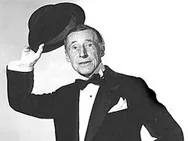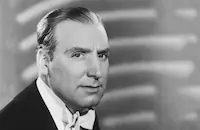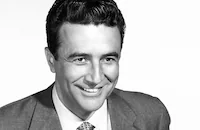Ma and Pa Kettle at Home

Brief Synopsis
Cast & Crew
Charles Lamont
Marjorie Main
Percy Kilbride
Alan Mowbray
Alice Kelley
Brett Halsey
Film Details
Technical Specs

Synopsis
During winter in Cape Flattery, Washington, Elwin Kettle, one of Ma and Pa Kettle's fourteen children, and his girl friend, Sally Maddocks, both win a National Magazine essay contest entitled "My Life on a Typical American Farm." Unfortunately, Elwin lied in his essay in order to glorify the farm, and the judges plan to visit both farms before deciding to whom the four-year college scholarship prize should be awarded. The prize is to be given on the basis of who provides the best environment for rearing children. The Kettles, concerned that their ramshackle farm cannot compare to neighbor John Maddocks' estate, set out to improve the homestead in the few days before the judges arrive. Pa spends Elwin's initial one hundred dollars in prize money on Maddocks' cranky goats, which immediately wreck the house. He then buys supplies on credit at Billy Reed's store, and puts his Native American friends, Geoduck and Crowbar, to work whitewashing the shed. Over the next few days, everyone toils furiously while lazy Pa naps and directs their work. Afraid of wasting supplies, Pa instructs Geoduck and Crowbar to construct a makeshift machinery shed, smokehouse and silo out of cardboard, and borrows equipment, animals and a tractor from their neighbors. By the time the judges, hypochondriac magazine editor Mannering and ex-farmer photographer Pete Crosby, arrive, the farm looks impressive, from a distance. Ma and Pa are trying on a corset and slip from a traveling saleswoman when Mannering appears, and immediately horrify the persnickety editor, who is further dismayed by the rustic accommodations. At lunch, the family attempts to be proper. Although Pete loves Ma's home cooking, Mannering wants only melba toast. Later, they try to dissuade Mannering from inspecting the farm, succeeding when the Kettle bull, Nick, takes off after Maddocks' cow Bessie, and everyone chases it. The next morning, Ma drags Mannering to the measly "orchard" and then pushes him into the pig sty in order to keep him from noticing that the buildings are cardboard. When he then tries to take a bath, little Billy Kettle deposits a frog in his tub. At night, Pete, who has discerned the ruse, tells Ma that it does not take money to be a good parent, and watches as the children recite their prayers in unison. The next day, Geoduck and Crowbar, whom Mannering assumes are wild Indians, scare him away from the buildings, but that night, a heavy rain washes all the cardboard and white paint away. Mannering wakes to find the farm as derelict as ever, and storms to the Maddocks' in protest. There, Mannering and Pete witness Maddocks' rough treatment of his wife and daughter, but admire his fine farm. Soon after, Pa devises a plan to impress Mannering and hires Geoduck's friends to pose as wild Indians so Pa can appear to be a hero. While Pa brings Mannering and Pete into the woods to cut down a Christmas tree, Geoduck urges his friends to apply "Indian" costumes and makeup, though they declare that it would be easier to send Elwin to college themselves than to put up with the indignity. The Indians "attack," following the wagon even after Pa accidentally rushes it onto the main highway. There, the police stop them, and Pa is forced to confess his plot. Mannering is more furious than ever, but Ma convinces him to attend their Christmas party the following night. Before he, Pete and the Maddocks leave their farm, Mannering watches as Maddocks refuses to give his wife or daughter any presents. At the Kettles', the house is warm, cozy and full of gifts, guests and children. Ma reads a poem that gently teases everyone present, and later Pa appears as Santa Claus, the children sing carols, and Pa hands out gifts. Mannering, upon seeing that Geoduck and Crowbar have given him a headdress, shakes their hands. Ma has wrapped her treasured prize-winning quilts into gifts, pretending they are from Mr. Maddocks to his wife and Sally. When Maddocks sees their delight, he realizes he has been amiss in not buying them presents, and announces that he is withdrawing Sally from the contest. Mannering, however, states that this would be unfair, and instead decides to split the award between the two kids, giving each a two-year scholarship. When Pete then suggests that the town form a 4-H group so children can raise money for college, Maddocks agrees to fund the club. Caught up in the spirit, Pa declares he will soon fix up the farm for real--as soon as Geoduck and Crowbar find the time.

Director
Charles Lamont
Cast

Marjorie Main

Percy Kilbride

Alan Mowbray
Alice Kelley
Brett Halsey

Ross Elliott

Mary Wickes
Oliver Blake
Stan Ross
Emory Parnell

Irving Bacon
Virginia Brissac

Richard Eyer
Guy Wilkerson
Edmund Cobb
Edgar Dearing
Betty Mcdonough
Helen Gibson
Judy Nugent
Carol Nugent
Donald Macdonald
Coral Hammond
Patrick Miller
Nancy Zane
Gary Pagett
Donna Cregan Moots
Whitey Haupt
Pat Morrow
Tony Epper

James Flavin
Robert Nelson

Marjorie Bennett
June Whitley

Rick Vallin
Hank Worden
Ken Terrell
Crew
Robert Boyle
Milton Bronson
Leslie I. Carey
Ron Conlon
Russell A. Gausman
Joseph Gershenson
Carl Guthrie
Bernard Herzbrun
William Holland
Kay Lenard
Ruby R. Levitt
Gordon Mclean
Joseph Mohr
Jay Morley Jr.
J. S. Pierpont
Robert Pritchard
Art Siteman
Joan St. Oegger
Roy Tripp
Leonard Weiner
Bud Westmore
Richard Wilson

Film Details
Technical Specs

Articles
Ma and Pa Kettle at Home
Directed by comedy veteran Charles Lamont (who had worked with everyone from Mack Sennett, to Buster Keaton to Abbott and Costello) and with a screenplay by Kay Lenard, from her original story, based on the characters created by Betty MacDonald in her novel The Egg and I, Ma and Pa Kettle at Home co-starred the always reliable Alan Mowbray and Mary Wickes, along with Irving Bacon and Virginia Brissac. The music was by William Lava, Herman Stein, and a young Henry Mancini (all uncredited).
The plot revolves around young Elwin Kettle (Brett Halsey) trying to win a college scholarship from National Magazine. Elwin becomes a finalist in the contest, but a snooty editor (Mowbray) from the magazine must come and stay at the family farm for a few days. The whole Kettle clan--in this film numbering fifteen kids--must make themselves presentable at Christmastime to help Elwin win.
The film opened in Los Angeles on April 14, 1954. Film critic Leonard Maltin later wrote that he considered this the best and funniest film of the "Kettle" series. Although the critics never took much notice of the "Ma and Pa Kettle" films, they made a lot of money for Universal Studios.
After Kilbride left the series, Marjorie Main continued on for two more films without him, before her own retirement in 1958. She once said of her most famous character, "I always thought of Ma Kettle as a real person. She was someone that I could imagine driving out into the country to see. Ma Kettle was a grand person."
SOURCES:
The Internet Movie Database
Maltin, Leonard Turner Classic Movies Presents Leonar Maltin's Classic Movie Guide: From the Silent Era Through 1965: Third Edition
http://www.tcm.com/tcmdb/title/82220/Ma-and-Pa-Kettle-at-Home/
Vogel, Michelle Marjorie Main: The Life and Films of Hollywood's 'Ma Kettle'
By Lorraine LoBianco

Ma and Pa Kettle at Home
Quotes
Trivia
Notes
The working titles of this film were Ma and Pa Kettle Hit the Road Home and Ma and Pa Kettle Hit the Road. According to March 1953 Hollywood Reporter news items, Edward Everett Horton, who had been absent from the screen for seven years, was cast in the film but was forced to withdraw when he could not procure a release from his commitment to the New Orleans Opera. The Los Angeles Times review erroneously refers to the film as Pa and Ma Kettle at Home. For more information on the "Ma and Pa Kettle" series, please consult the Series Index and see the entry for Ma and Pa Kettle in AFI Catalog of Feature Films, 1941-50.

Miscellaneous Notes
Released in United States Spring March 1954
Released in United States on Video February 14, 1995
Seventh installment of the "Ma and Pa Kettle" series.
Released in United States Spring March 1954
Released in United States on Video February 14, 1995














